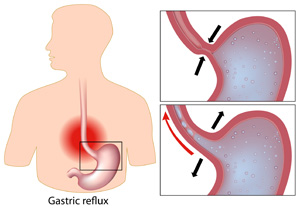Gastric Problems

A Look Into Four Types Of Gastric Problems
Thee are many different disorders which could fall into the category of gastric problems, most of which would fit somewhere in the four categories discussed here. Most of these gastric problems cause only temporary unpleasantness or discomfort, though some are more severe and sometimes require medical treatment.
The Problem Of Excessive Gas - Excessive gas is one of the milder gastric problems we are apt to suffer, though it can cause discomfort, not to mention occasional embarrassment. The gas we experience in flatulence is sometimes odorless, sometimes not. It is composed mainly of nitrogen, oxygen, and carbon dioxide, all elements having no detectable smell. At times methane is a part of the mix, and in the worst case, as the gas passes through the rectum, bacteria residing there contribute gases containing sulfur, causing an unpleasant odor.
Much of the gas associated with burping or belching is the result of swallowing air. Every one of us does that, but some do more than others, especially when eating or drinking rapidly. The gases associated with flatulence are often caused when food has not been digested completely in the stomach, and the breakdown is completed in the large intestine. Gas released by this process has nowhere to go but out through the rectum.
Not everyone produces an equal amount of gas, and foods that cause gas in some people do not cause it in others. Our individual genetic make up and body chemistry appears to play a role here. The amount of gas produced can be controlled to a degree by the foods we eat, though again, different foods affect some people differently than others. Foods containing carbohydrates, which break down into sugars, tend to produce gas, as do sugars themselves, particularly lactose and fructose. Raffinose is a sugar we don't hear too much about, but is found in beans, and as everyone know, bean are a major villain as far as gas is concerned. Starches and soluble fibers also cause gas as they are usually broken down in the large intestine.
If problems with excess gas appear to be chronic, it is well to seek medical attention, or at least have some tests done to see if a more serious underlying disorder is present. For the most part though, excessive gas is usually not serious.
Indigestion - A second category of gastric problems is indigestion. This particular form of a gastric problem is usually something we bring upon ourselves. Overeating, or eating too rapidly are the usual causes, and as far as indigestion is concerned, prevention rather than treatment is usually the best approach. Excessive amounts of alcohol, some drugs or medications, and stress or anxiety, can all contribute to indigestion. Drinking fluids, especially water, with meals is one good way to prevent indigestion, and chewing food well helps also. Most cases of indigestion will clear up rapidly by taking a home remedy such as baking soda in water. Like the problem with excessive gas, chronic or acute indigestion may mean presence of a more severe underlying condition.
Acid Indigestion - A third category of gastric problems is acid indigestion. Here the cause is not necessarily overeating, but one of the stomach producing an excess of acid during the digestive process. The acid can contact nerve endings in the stomach, causing pain or distress. An antacid pill will more often than not provide a quick cure. If the condition becomes chronic however, a stomach ulcer could be the ultimate result. As with the other categories, an occasional bout of acid indigestion is seldom anything to worry about, but if acute or chronic, seek medical advice.
Heartburn - The fourth category, also caused by stomach acid is heartburn, caused when stomach acid backs up into the esophagus. The primary symptom is a burning sensation in the throat, and at times swallowing may be difficult. Medications which reduce production of stomach acid is the standard treatment. These same medications often also serve to prevent formation of ulcers by strengthening the protective coating on the inside of the stomach, and also reduce the chances of reflux, the backing up of acid into the esophagus. Most medications effectively treat the condition in several weeks. If heartburn persists, seek medical advice to avoid the possibility of severe damage to the tissues of the esophagus.
Summarizing, most of the gastric problems falling in any of the above categories can either be prevented, or respond well to simple medications. Chronic ailments however can result in more serious problems, or signal the presence of underlying conditions requiring medical attention.